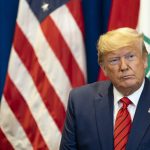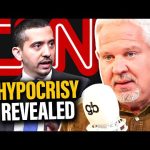In a recent rally at Madison Square Garden, a notable event turned sour as comedian Tony Hinchcliffe strolled on stage to deliver a lackluster set before the crowd. While the presence of former President Trump was undoubtedly the main attraction, Hinchcliffe’s performance became a talking point in its own right, specifically for its perceived insensitivity. He reportedly made a series of racially charged jokes, which many found questionable given the context of an election campaign. This incident raises pertinent questions about comedy, political campaigns, and the expectations that come with them.
Firstly, it is essential to recognize the comedic landscape in which Hinchcliffe operates. Known for his edgy style, he has garnered attention in the past for his sharp wit, notably during the roast of NFL star Tom Brady. However, the nature of comedy is such that not every performance lands well. In this instance, viewers struggled to find humor in what he presented, with some branding the material as “hackneyed” and far from original. Commentary suggests that jokes about Puerto Ricans, Jews, and other diverse groups are likely to fall flat, particularly when they come off as mere attempts to be provocative rather than genuinely funny.
This brings us to the broader implications of these jokes in a political context. During a rally designed to galvanize support, the inclusion of humor that touches on sensitive racial topics can easily backfire. The Trump campaign’s decision to distance itself from Hinchcliffe’s act indicates an understanding of the precarious nature of balancing humor and respect in a diverse electorate. It also introduces the element of accountability in the realm of comedy. While comedians often operate under the guise of artistic freedom, unintended consequences can arise when jokes are made at the expense of marginalized groups, especially during a politically charged atmosphere.
Although the media often enjoys blowing incidents out of proportion, one must ask how many voters will be swayed by one poorly received set. Hinchcliffe’s ill-timed humor, while regrettable, is unlikely to make or break an election. Most Americans recognize that jokes don’t reflect the core values of a campaign or a candidate. As many voters tune in to rallies for more substantial discussions on policy and governance, an ineffective stand-up routine is simply a blip on the radar.
Finally, campaigns must remember the power of their messaging. While the entertainment world can be alluring, focusing on the issues that matter most to constituents is vital. The potential for comedy to detract from the principal themes of a campaign, especially when it veers into contentious territory, is too high. As such, the Trump campaign may want to take this as a learning moment that reinforces the importance of surrounding itself with voices that amplify rather than undermine its message of unity and progress, lest it get caught in the comedic crossfire next time.
In conclusion, while Tony Hinchcliffe’s attempts at humor may not have resonated with the audience at Madison Square Garden, they offer a valuable lesson on the importance of prudence in political discourse. Campaigns must tread carefully, ensuring that every presentation aspect, including humor, aligns with their overall mission. After all, voters care more about policies and practical solutions than the often transient world of stand-up comedy.




